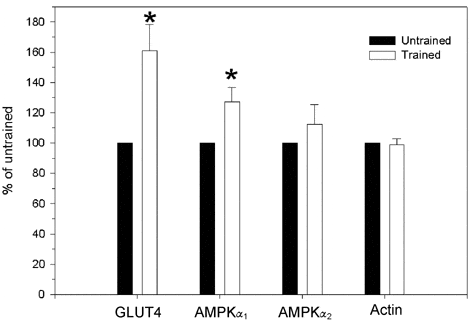Endurance training elicits profound adaptations of skeletal muscle, including increased expression of several proteins. 5Ì-AMP-activated protein kinase (AMPK) may be one of these, considering the fact that acute exercise increases AMPK activity. Repetitive exercise bouts (i.e. training) might induce increased transcription and expression of the protein. On the other hand, even decreased AMPK expression is a possibility, since chronic stimulation with aminoimidazole-5-carboxamide-1β-D-ribofuranoside (AICAR) (to some extent mimicking exercise) results in a downregulated response to a single AICAR stimulation. We measured AMPK and GLUT4 protein expression in human skeletal muscle in trained (T) and untrained (UT) legs on days 8, 14 and 30 in a 4-week one-legged endurance-training programme. The local ethical committee approved the study. Eight young (25 ± 1 years) (mean ± S.E.M.) lean, healthy males trained one leg (while the other leg remained resting) on an ergometer bicycle for 30 min day-1 at a workload corresponding to ~70 % of maximal oxygen uptake. Muscle biopsies were obtained ~18 h after the previous training session. On day 8 GLUT4 protein expression was 36 % higher in T compared with UT (P < 0.05) (paired t test), but no further increase was seen at days 14 and 30 despite continuously increasing absolute workloads. Expression of AMPKα2 did not change with the training. In contrast, expression of AMPKα1 was 27 % higher in T vs. UT muscle (P < 0.05) (measured only on day 30).
GLUT4 protein expression increases substantially after 7 days of endurance training with no further increase with prolonged training at progressively increasing workloads. AMPKα1 and α2 behave differently in their expression in response to endurance training. AMPKα1 protein content is increased after 1 month of training, while no change in AMPKα2 expression was detected over the time course of the training period.
This study was supported by the Danish National Research Foundation (grant no. 504-14).

